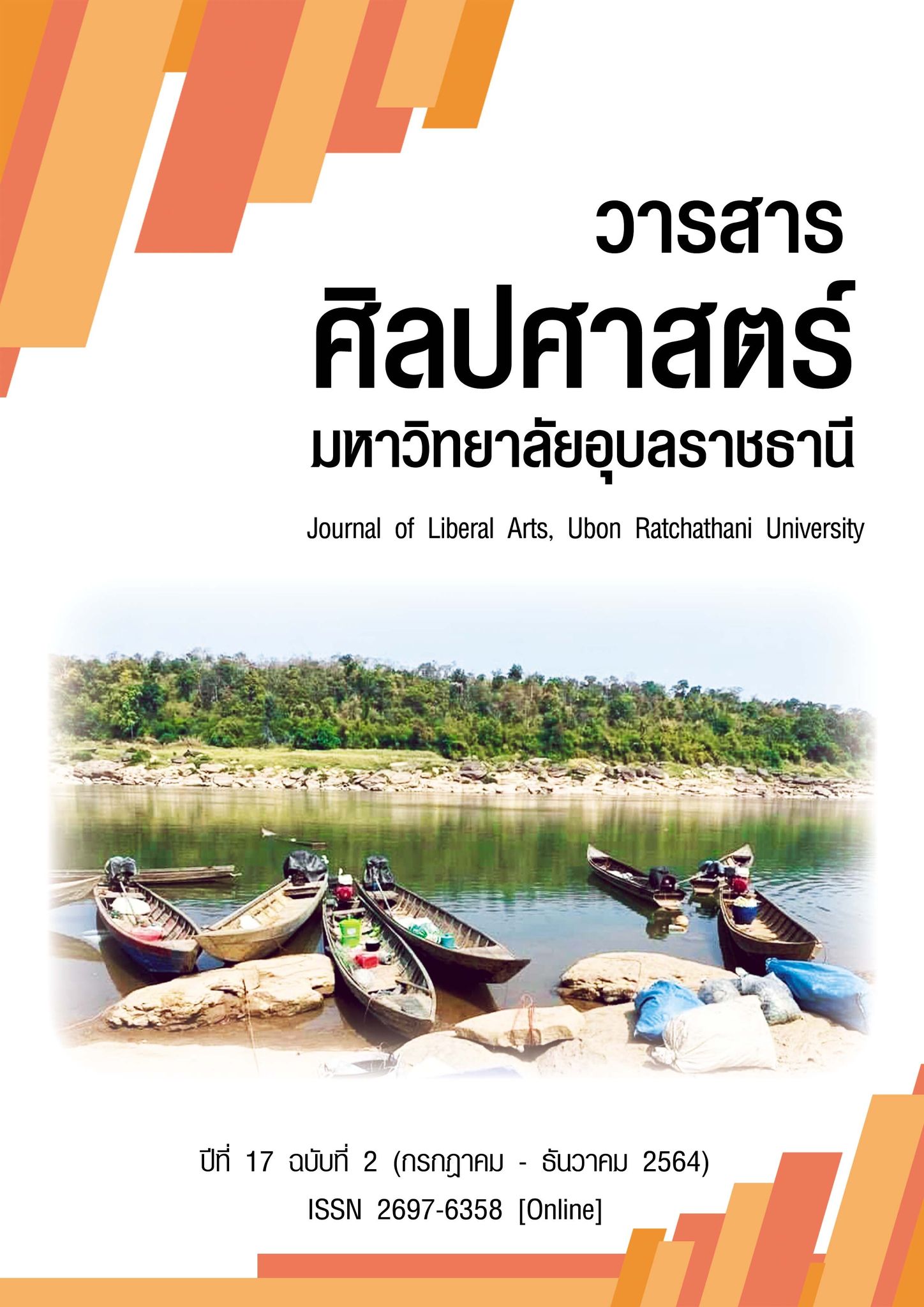บทบาทของรัฐและกลุ่มทุนแพลทฟอร์มจีน ในธุรกิจอีคอมเมิร์ชจีนข้ามแดน
Main Article Content
บทคัดย่อ
บทความนี้ศึกษาบทบาทรัฐและทุนจีนที่แผ่ความเป็นมหาอำนาจทางเศรษฐกิจผ่านการทำธุรกิจค้าปลีกอีคอมเมิร์ซจีนข้ามแดน (China Cross-Border e-commerce) ธุรกิจดังกล่าวได้รับความสำคัญจากรัฐจีนตั้งแต่คริสต์ทศวรรษ 2015 แต่ถูกยกระดับมากขึ้นภายใต้บริบทใหม่ในการค้าระหว่างประเทศที่พบความตึงเครียดระหว่างจีนกับสหรัฐและสถานการณ์โควิด 19 จีนใช้เวทีธุรกิจอีคอมเมิร์ชข้ามแดนสร้างความหลากหลาย ลดการพึ่งพิงการส่งออกไปสหรัฐอเมริกา ขณะที่สามารถเชื่อมโยงการค้ากับประเทศในโครงการริเริ่มหนึ่งถนนหนึ่งเส้นทาง (BRI) และเชื่อว่าจะช่วยสนับสนุนโครงข่ายอุตสาหกรรมใหม่ในห่วงโซ่อุปทานผ่านธุรกิจอีคอมเมิร์ชข้ามแดน บทความนี้ใช้แนวคิดระบอบการเคลื่อนย้าย (Mobility regime) ในการวิเคราะห์ และใช้ระเบียบวิธีวิจัยทางสังคมศาสตร์ เก็บข้อมูลภาคสนามและทบทวนเอกสารวิชาการและข้อมูลเครือข่ายออนไลน์ รวมทั้งใช้เครื่องมือ Baidu Editor วิเคราะห์ข้อมูลเว็บไซต์ Baidu สำรวจความสัมพันธ์ของผู้ประกอบการจีนกับธุรกิจอีคอมเมิร์ชจีนข้ามแดนด้วย
บทความนี้ พบว่าระบอบการเคลื่อนย้ายของรัฐจีนในฐานะ “รัฐยุทธทางเศรษฐกิจ” (Economic statecraft) ที่วางโครงสร้างพื้นฐานและสร้างระบบนิเวศปูทางให้แก่บริษัทแพลตฟอร์มและผู้ค้าจีนในธุรกิจอีคอมเมิร์ชข้ามแดนมี 3 ประการสำคัญ คือ 1) การสร้าง“สภาวะยกเว้น” แก่เขตทดลองอีคอมเมิร์ชข้ามแดน 2) ยุทธศาสตร์ก้าวออกไปผ่านการสร้างจุดเชื่อมต่อด้วยคลังสินค้าต่างประเทศและระบบโลจิสติกส์ และ 3) การสร้างธรรมมาภิบาลในธุรกิจอีคอมเมิร์ชจีนข้ามแดน นอกจากนี้ ยังพบว่าระบอบการเคลื่อนย้ายของรัฐจีนได้เปลี่ยนชุดความสัมพันธ์ทางการค้าใหม่ที่เอื้อให้ทุนแพลทฟอร์มจีนเข้ามาเป็นผู้เล่นหลักในตลาดอีคอมเมิร์ชในอาเซียน ขณะที่เปิดโอกาสให้ผู้ประกอบการจีนขนาดกลางและเล็กทั้งรายเดิมและรายใหม่รุกไล่เข้าสู่ระบบนิเวศที่ถูกปูทางขึ้นในธุรกิจนี้ด้วย
Downloads
Article Details
เอกสารอ้างอิง
Laungaramsri, pinkaew. (2018). After Special Economic Zone. (in Thai) Chiang Mai: Faculty of Social Sciences, Chiang Mai University.
Siriphon, Aranya. (2019). Chinese Influence and the Impact to Tourism and Agriculture Security in Northern Thailand, Final Report. (in Thai). Bangkok: Thailand Research Fund.
TangNirandon, Arm. (2018). China 5.0: Xi Jinping, New Era Economy and AI Big Plan. (In Thai). Bangkok: Bookscape.
Kriddikorn. (September 25, 2020). Exploring Thai E-Commerce Foreign Companies dominate the Markets, predicting 2020 with the 2.2 hundred Million Bt. (In Thai). Business Knowledge. Retrieved July 25, 2021, from https://workpointtoday.com/ecommerce-thailand-in-2020/
Castells, M. (1996). The Information Age: Economy. Society and Culture, vol. I: The Rise of Network Society. Oxford: Blackwell.
Castells, M. (2000). Materials for an Explanatory Theory of the Network Society. British Journal of Sociology, 51 (1), 5-24.
Castells, M. (2005). “Space of Flows, Spaces of Places: Materials for a Theory of Urbanism in the Information Age.” In Bishwapriya, S., editor. Comparative Planning Cultures. (p. 45-64). New York: Routledge.
Cresswell, T. (2006). On the Move. Mobility in the Modem Western World. New York: Routledge.
Chen, Qian. (2021). Government Support, Industry Agglomeration and Cross-Border E-Commerce Development in the Context of Digital Economy (Shuzijingji Beijingxia de Zhengfuzhichi, Chanyejiju Yu Kuajingdianshang Fazhan ). E-Commerce (Dianzi Shangwu), 24, 68–71.
Kosaikanont, R. (2019). “Chinese Capital Going Global: Thai-Chinese Industrial Zone and Labor Conditions in Thailand.” In Santasombat, Y., editor. The Sociology of Chinese Capitalism in Southeast Asia: Challenges and Prospects. (p. 169-194). Singapore: Palgrave Macmillan.
Ong, A. (2004). The Chinese Axis: Zoning Technologies and Variegated Sovereignty. Journal of East Asian Studies, 4, 69-96.
Ong, A. (2006). Neoliberalism as exception: Mutations in citizenship and sovereignty. Durham, London: Duke University.
Schiller, N. G. and Salazar, N.B. (2012). Regimes of Mobility across the Globe. Journal of Ethnic and Migration Studies, DOI:10.1080/1369183X.2013.723253.
Shamir, R. (2005). Without Borders? Notes on Globalization as a Mobility Regime. Sociological Theory, 23, 2, 197-217.
Luthje, B. (2019). Platform Capitalism ‘Made in China’? Intelligent Manufacturing, Taobao Villages and the Restructuring of Work. Science, Technology and Society 24, (2), 199-217.
People's Daily Online. (2021, 19 January). Warehouses Help Chinese Companies Sell Products to more Places around the World. Retrieved August 12, 2021, from http://en.people.cn/n3/2021/0119/c90000-9811056.html
Srnicek, N. (2017). Platform capitalism. Cambridge, UK: Polity Press.
Statcounter. (2021). Search Engine Market Share China. Retrieved August 14, 2021, from https://gs.statcounter.com/search-engine-market- share/all/china
The State Council. (2021, 30 March). Overseas Warehouses of Chinese Enterprises Drive Win-Win Development for International Trade. Retrieved August 10, 2021, from http://english.www.gov.cn/news/topnews/202103/30/content_WS606293afc6d0719374afbc85.html
Wang, Butao. (2019, 1 May). Pingpong Dedicates to Low-cost Cross-border Payments. Retrieved August 10, 2021, from https://equalocean.com/analysis/201905011975
Wong, Frank Ka-Ho. (2019, 10 January). China’s Crackdown on Daigou, New Cross-Border E-Commerce Policies. China Briefing. Retrieved August 10, 2021, from https://www.china-briefing.com/news/chinas-crackdown-daigou-cross-border-e-commerce-policies/
Wu, Guangming. (2016). Build Cross-border E-commerce "Overseas warehouse" Platform Effectively. A proceeding at the 2nd International Conference on Social Science and Technology Education (ICSSTE, 2016). Retrieved August 10, 2021, from https://www.atlantis-press.com/article/25852702.pdf
Zhang, Zoey. (2020). An Introduction to China’s Cross-Border E-Commerce Pilot Zones and Pilot Cities. China Brief. Retrieved August 12, 2021, from https://www.china-briefing.com/news/cross-border-e-commerce-china-introduction-cbec-pilot-zones-pilot-cities./
Zhang, Xiaheng, and Yixin Chen. (2019). Research on the Operational Performance Evaluation of Integrated Pilot Zones for Cross-Border E-Commerce. China Business and Market, 33 (9), 76–83.
Zhao, Yipu. (2020, 28 August). Cross-border E-commerce Helps Speed Economic Recovery in Southeast Asia. People's Daily. Retrieved August 1, 2021, from http://en.people.cn/n3/2020/0828/c90000-9739302.html


